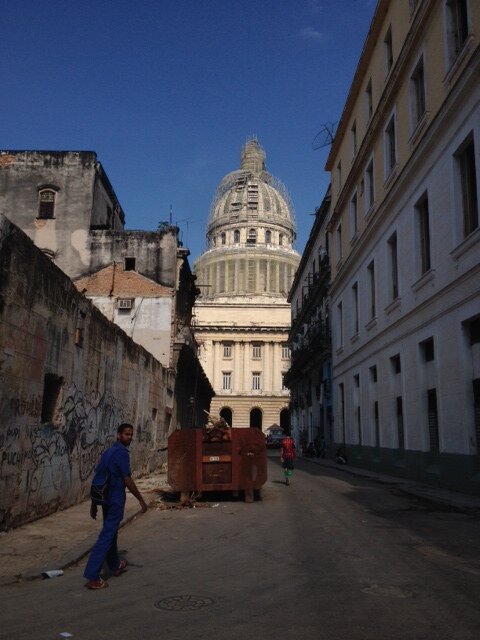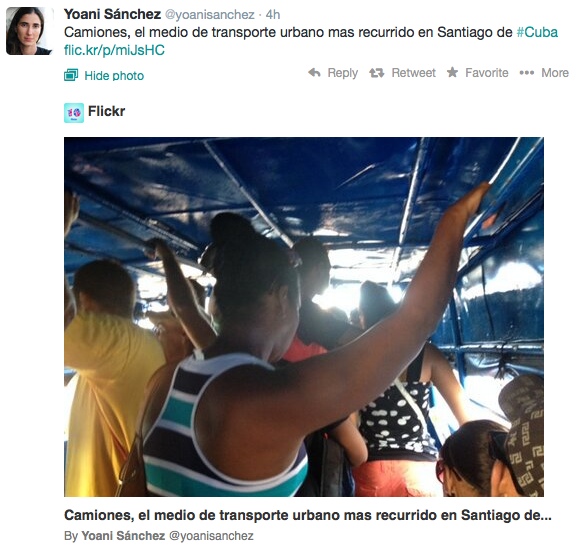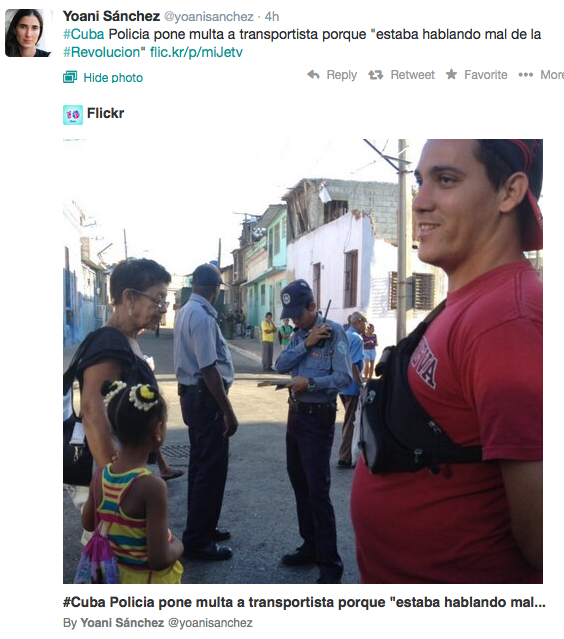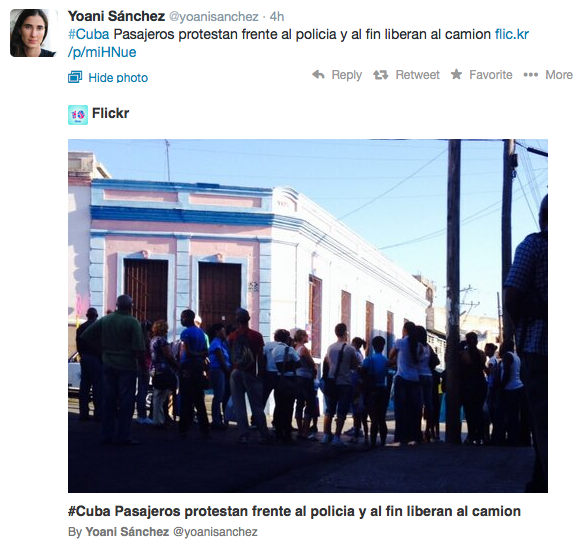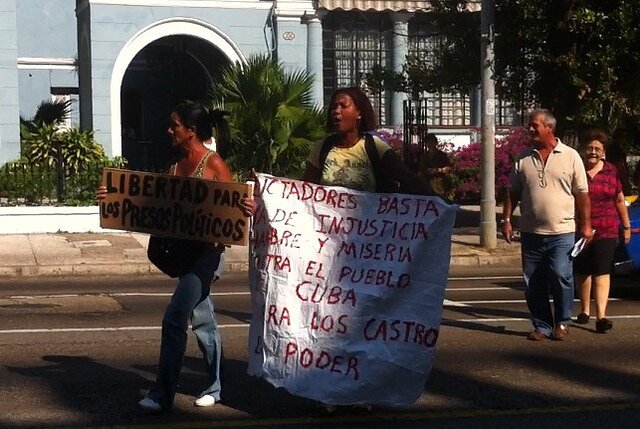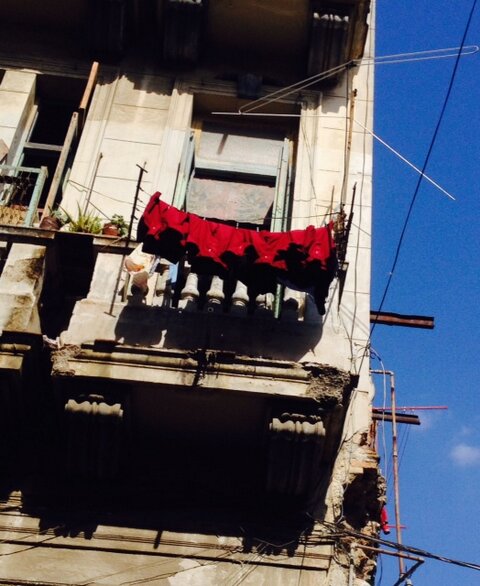
Category: Yoani Sanchez
Occasional Photos / Yoani Sanchez
Occasional photos / Yoani Sanchez
Occasional Photos / Yoani Sanchez
Membership Card or Passport? / Yoani Sanchez
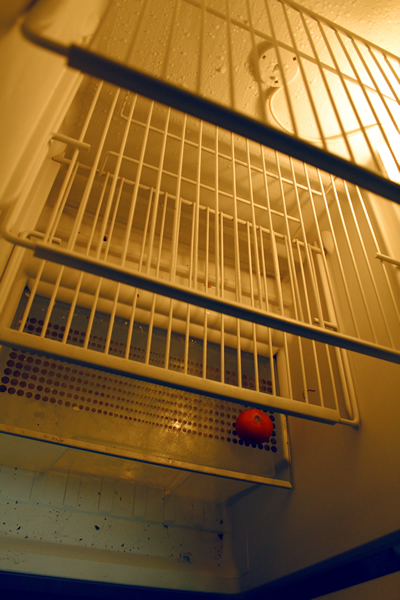
The whole neighborhood called him by the peculiar last name he’d inherited from his Basque grandfather. Vertical for ideological reasons, he always made it clear that he was “a man of the cause.” Meeting after meeting, report after report, complaint after complaint, few exceeded him in offering proofs of faith in the system. He was also characterized by his severe face against the protestors and the hugs he gave to those who shared his ideology. And so it was, until a week ago.
The family tree bore fruit and the combative man just managed to get his Spanish passport.* In his Communist Party nucleus they told him to choose: foreign nationality or continuing to be a member of that organization. Faithful, but not stupid, he chose the first. As of a few days ago he premiered his new life without red card or statutes. He has already started to wink at some of the dissidents in the neighborhood. “You know you can always count on me,” he blurted out at someone who, until recently, he’d always kept a watch over.
It’s a curious party organization that brags about exercising internationalist solidarity, but doesn’t want dual nationality communists in its ranks. At least such narrow-mindedness is helping to convert certain extremists into “meek foreigners.” Given the speed with which they change, one wonders if they previously believed in what they were doing, or were simply opportunists. Perhaps in preferring an EU passport they are just choosing a different mask, a new tone for their chameleon skins.
*Translator’s note: Spain’s Law of Historical Memory set a limited period during which Cubans who could prove a Spanish grandparent qualified for Spanish citizenship.
28 March 2014
A Day Without the Self-Employed / Yoani Sanchez
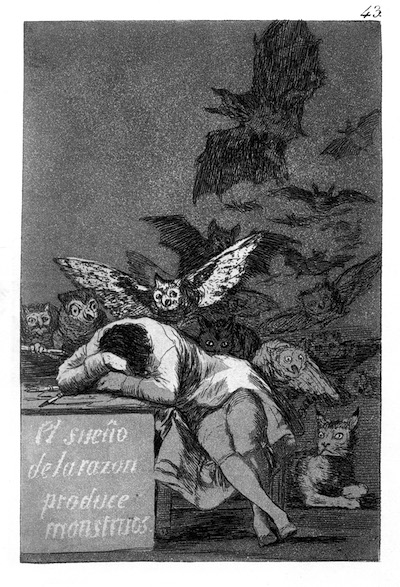
The day started with a certain nightmarish atmosphere. The little sip of morning coffee was missing, because the seller with a thermos and paper cups wasn’t on the corner. So she dragged her feet to the bus stop, while keeping an eye out for a collective taxi. Nothing. Not even an old Chevrolet came down the avenue, nor was there one of those ingenuous station wagons that can fit up to twelve people anywhere in sight. After an hour’s wait she managed to climb on the bus, irritated that she didn’t even have a little paper cone of peanuts to calm the hunger pangs emanating from her stomach.
At work that day she couldn’t do much. The director didn’t make it in because the woman who cares for her daughter was absent. The same thing happened with the administrator; her Russian-made Lada blew a tire and the tire-repair guy in her neighborhood closed early. At the lunch break the food trays were so empty they barely weighed a thing. The guy with the cart selling vegetables and tubers, with which they stretch the lunch menu, didn’t come by. The head of public relations had a nervous breakdown because he couldn’t print the photos he needed for a visa. The door of the nearest studio had a sign saying “Not Open Today,” so his travel plans were ruined.
She decided to walk home to avoid having to wait. Her son asked if there was something to snack on, but the bread delivery man, with his sharp cry, hadn’t shown up. Nor were the pizza kiosks open, and a raid on the farmers market had left all the stands empty. For dinner she cooked the little she found and washed the dishes with a rag from an old shirt, because there weren’t any vendors selling dish mops. On top of everything, the fan wouldn’t go on and the appliance repairman wasn’t in his workshop.
She went to bed, in a pool of sweat, uncomfortable, hoping she would wake up to the return these figures who make her life possible: the self-employed, without whom her days are a sequence of deprivations and aggravations.
27 March 2014
And You, Son, Don’t Stand Out / Yoani Sanchez

You’re getting your bag ready for school and listening to your mother nag. “Don’t get into anything that’s going to make a ton of trouble for you later,” she shouts from the kitchen. So you go to the morning assembly at school, withdrawing into yourself so they won’t notice you. The bell rings to enter the classroom and there’s the history teacher with her Manichean version of the past. You know it wasn’t like what she says because you’ve read other versions in your grandfather’s books, but you keep quiet… so as not to look for trouble.
Your voice went hoarse and then you were a soldier serving your time in the military. You had to learn the lesson of survival. So when the officer shouted and demanded greater dedication, you mentally repeated, “Better not to be noticed.” Get by unscathed, don’t get involved, avoid them noticing you, were your premises at that age. Don’t offer an idea, don’t suggest a change, the only thing your bosses will hear from your mouth is “at your service!” Later you made it to the university, where the objective was to get a diploma, to graduate, without any complications.
Your children were born and when they were little you read them the riot act about simulation, how to fake it. “Make sure you don’t stand out, it only brings trouble,” you counseled them from the time they could understand. With this action you prolong the cycle of simulation in your offspring, as your parents once did with you.
But you have not come out unscathed. You’re not a crook who has deceived others, but you have cheated yourself. With so much self-restraint, limiting your expressions, and avoiding speaking up, you have become the mediocre man you are today, a being tamed by the system.
26 March 2014
Cosita / Yoani Sanchez

She left Banes on a hot and dusty morning. In a bag, some underwear and the address of relatives in Havana. When the train got to Central Station, Cosita took a deep breath and filled her lungs with that aroma of burnt oil typical of the capital. “I’m on the roof*,” she said to herself, with a feeling of victory. Six months had passed and she was returning to the city with a record of a police warning and a piece of a washing machine boarding the train with her.
Cosita settled into her cousin’s room and started to collect plastic bottles and pieces of nylon from the nearest trash cans. With these she made artificial flowers which she sold in order to eat and to “give something” to her Havana relatives. She asked around the neighborhood looking for single men — older ones — to whom she could offer herself as a “cleaning lady, who can do everything around the house,” but didn’t find any takers. She knew her days were numbered until the police would stop her in the street and discover she was an illegal. One more “Palestinian,” as many capital residents disrespectfully call people from the east of the country.
They caught her one gray and rainy afternoon, while she was selling flowers outside the farmers market. They imposed a fine, for illicit economic activity, and warned her that she had 72 hours to get out of the city. But Cosita couldn’t leave yet. She’d managed to acquire half of an Aurika washing machine, and didn’t have any way to transport it. A neighbor had also given her an old child’s wardrobe, without doors or drawers. These were all the material possessions she’d acquired on her Havana adventure and she wasn’t going to leave them behind.
The truck drivers wanted too much to transport her “treasures” to Banes. She could no longer sell her nylon decorations and the relatives who had welcomed her feared a new fine for having an illegal in their home. Cosita left, on a cold December night, with her piece of a washing machine and her bag as empty as when she had arrived. The wardrobe was abandoned in a hallway and someone used the boards to cover up a window where the rain was coming in. The clothes rod replaced a broken broom and the nails were reused in a chair.
Cosita, in Banes, dreams of returning to Havana. She tells her friends stories of her days in “the capital of all Cubans” and dreams of that “children’s furniture, of good wood,” that someday she might manage to bring — as a trophy — to her village.
*”La placa,” [in the original Spanish] is one of the popular ways to refer to Havana.
Translator’s note: “Cosita” literally means “a little thing.”
25 March 2014
A Few Days With Nauta / Yoani Sanchez

“The line’s long but it’s moving fast,” someone tells me outside a Cubacel Office. After an hour and several shouts from the guard whom we crowded around at the door, I managed to enter. The clerk is bleary-eyed and warns me that I can only open a Nauta email account there, but “under no circumstances is the account configured for a mobile phone.” This provokes a little, “It doesn’t matter, I know how to do it, I already downloaded the Internet manual.” The little twist of the knife works because she asks me, curious, “Oh really… and could you help a friend of mine who doesn’t know how to do it?”
This won’t surprise my readers, we’re in Cuba where restrictions and chaos mix. Where the same entity that should help its clients ends up asking them for help. So I lent a hand with the friend and her email activation.
After gaining her trust, I was able to get a little information from the bored clerk. “I’m sure the Internet will be available soon on cellphones,” I let fall, just another comment. She clicked her tongue and offered, “Don’t get your hopes up,” turning to me from the desk. Then I attacked, “Well, if it’s the Venezuelan cable, I imagine the service will expand.” And that’s when the employee hinted to me, “This cable comes from somewhere else,” while putting her index finger near her eye as the signal for “vigilance.”
I go home, stumbling at every step because I’m looking at the cellphone screen where it shows new messages. First I write several friends and family members warning them that “this email @nauta.cu is not reliable or secure, but…” And then a long list of ideas for the uses of a mailbox that isn’t private, but that I can check any time from my own cellphone. I ask several acquaintances to sign me up for national and international news services via email. Within an hour a flood of information and opinion columns is stuffing my inbox.
I spend the following days searching out the details of the service, its limits and potential. I conclude that for sending photos it’s much cheaper than the previous method through MMS messaging. Before, the only option was to send an image, with agonizing slowness, costing 2.30 CUC ($2 USD). Now, I can do it through Flickr, TwitPic and Facebook through their email publication service, paying 0.01 CUC for each kilobyte. The average photo for the web doesn’t exceed 100 Kb.
Among its possibilities, is also the ability to maintain a flow of long texts — far beyond the 160 characters of an SMS — with Cubacel users who have already activated the service. In the first 48 hours I managed to create news feeds for other activists in several areas of Cuba. So far all the messages have arrived… even thought the Nauta contract threatens to cut off the service if it is used for “activities…against national independence and sovereignty.”
I also tested the effectiveness of the GPRS connection, needed to send and receive emails, from several provinces. In Havana, Santiago de Cuba, Holguín, Camagüey and Matanzas I was able to connect without major problems. There are some stretches of road where there aren’t even signals to make calls, but the rest of the tries were successful.
It’s not all good news
Coinciding with the new email service on cellphones, there has been a noted deterioration in the sending of text messages. Hundreds of messages in recent days never reached their recipients, although the telephone company quickly charged for them, which points to an act of censorship or the collapse of the networks. I would prefer to think it’s the latter, if it weren’t for the fact that among the greatest failures were activists, opponents, independent journalists and other “uncomfortable” citizens.
On the other hand, let’s not be naive. Nauta has all the hallmarks of a carnivorous network that swallows information and processes our correspondence for monitoring purposes. Very likely there is a filter for key words and minute-by-minute observation of certain people. I don’t discard the possibility that the content of private messages will be published in the official media, should the government deem it appropriate. Nor do I rule out phishing to damage the prestige of some customers, or the use of information–such as emails published on social networks–to impersonate others.
All these possibilities need to be taken into account when using the new service, because there is no independence between the telephone company and the country’s intelligence services. So every word written, every name referenced, every opinion sent via Nauta, could end up in State Security’s archives. We need to avoid making their job easier.
After a week with Nauta, my impression is that it is a crack that is widening. Through which we can project our voices, but also through which we could be abducted. A poor imitation of the web, a handicapped internet, their service is very far from what we have demanded as 21st century citizens.
Nevertheless, I suggest using this new option and pushing its limits, like we have done with text-only messaging. Used cautiously, but with a civic conscience, this path can help us to improve the quality and quantity of information we receive and of our own presence on the social networks. Its own name already says it, if we can’t be internauts… at least we can try being nautas.
24 March 2014
Driver Fined for “Speaking Badly of the Revolution” / Yoani Sanchez
Why Don’t I Want to be “Federated”? / Yoani Sanchez
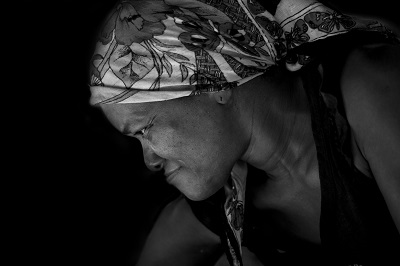
The Congress of the Cuban Women’s Federation (FMC) ended a few days ago. At its closing ceremony, a man uttered the final words. But this wasn’t the only, nor the last, mistake of an antiquated organization marked by ideology.
After listening to the sessions in the Palace of Conventions, I affirm my decision not to be “federated.” Why?
Here are my reasons:
- I reject the creation of an “eternal president” in the figure of Vilma Espín, Raúl Castro’s deceased wife, because this whole display of perpetuity in a position seems to me, at the very least, ridiculous.
- I don’t want to be part of an organization whose flag shows a uniformed individual. I am not a soldier, I don’t see myself represented in a gun-carrying militia member.
- I don’t believe that a woman’s organization should have as its principles fidelity to an ideology, a party and a man.
- I suspect that a part of the four million women who make up the FMC have entered its rank purely automatically, as a mandatory process that takes place when you turn fourteen.
- I distrust a federation that benefits from the lack of freedom of association which prevents Cuban from creating other organizations.
- I’m aware of the double standards of the FMC, which says it rejects violence against women but which has never condemned the acts of repudiation against the Ladies in White.
- I consider inefficient the work of an organization that, in its 50 years of existence, hasn’t managed to place women in the positions of power where the decisions that affect the country are really made.
- I’m tired of women being reduced, in these female congresses, to beings concerned with pots and pans, soldiers who are willing to offer up their children as cannon fodder or production parts… selfless, beautiful and obedient.
- I am a woman of the 21st century, I carry my ovaries not with victimhood but with pride, and I can’t be a member of an organization that transmits the directives of power to women.
- Of course, when it is legal to associate according to one’s beliefs, affinities, genders and many other points of similitude, I will be there with my progesterone and my demands for a true female federation.
16 March 2014
Challenges of the Cuban Press / Yoani Sanchez
“The newspaper was talking about you…” sings the voice of Joaquín Sabina, while I read the newspaper Granma. On the cover, as usual, there’s some event. A tribute to a figure from the past, a reminder, a phrase someone said forty or fifty years ago. All the pages have this rancid stink of journalism that doesn’t dare to address the present, that avoids the here and now.
The Cuban official press can’t reform itself because to do so would be committing suicide. To report on the national reality it would have to renounce its role as ideological propaganda. It’s not enough to change the design of its digital sites, add new signatures to its articles, or keep the readers’ letters complaining about bureaucrats and corruption. It must go further and shed its political commitments and take on the truth as its only obligation. But this… this we know it cannot do.
I expect more from the press that will emerge, or consolidate, than a “new official journalism.” But I am also aware that the work of reporting from civil society, precarious and illegal, has to improve. Information is not trench warfare and it is not a weapon. Events should not be reported from the point of view of what we want to have happened, but from what did happen.
For its part, thematic variety is not contrary to the defense of freedom and human rights. There are many ways of speaking, and of speaking beautifully. We must search, then, for ways of reporting that bring us closer to ordinary readers. Creativity, daring and diverse points of view help us to be better professionals of the press. Going down that path is worth it.
For my part, I’m taking the first steps. The countdown to the digital media I’ve been working on for four years has begun. A new professional challenge approaches, but I will not be alone; rather I will be accompanied by a team of talented people who want to do journalism with a capital J.
In the coming weeks this personal blog will be transformed—right in front of your eyes—into a media of the PRESS. Words of encouragement are welcome!
14 March 2014
Women Demonstrating on 23rd in Havana / Yoani Sanchez
Devaluation / Yoani Sanchez
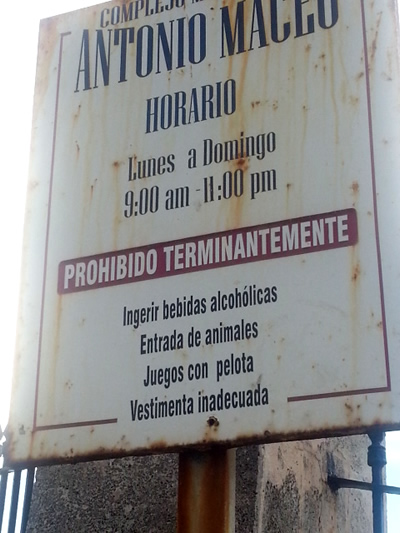
It’s difficult for a cell to maintain its health inside a sick organism. In an inefficient society the bubble of functionality bursts. In the same way, certain ethical values — selected and filtered — cannot be strengthened in the midst of a debacle of moral integrity. Rescuing codes of social conduct implies also accepting those that clash with the prevailing ideology.
We are now being called upon by the official media to recover lost values. According to the version put forth by the commentators on TV, responsibility for the deterioration falls mainly on the family, a portion on the schools… but not at all on the government. They talk about bad manners, rudeness, lack of solidarity and the extent of bad habits such as stealing, lying and laziness. In a country where for half a century the educational system, the entire press, and all the mechanisms of cultural production and distribution have been monopolized by a single party, one can only ask: what is the source of such impoverishment?
I remember that when I was a little girl no one dared to address another person as “señor” — mister — because it was a bourgeois throwback. As the use of “compañero” — comrade — is associated with an ideological position, many of us began to adopt new forms: “cousin,” “young man,” “hey you,” “Pop”… along with a long list of phrases derived from vulgar speech. Now they complain on TV that when we address others we are insulting, but… who started this deterioration?
The Cuban system opted for social engineering, and toyed with individual and collective alchemy. The most perfect example of this failed laboratory was the so-called “New Man.” This Homus Cubanis would supposedly come of age in sacrifice, obedience and loyalty. His uniformity was incompatible with the particular ethics of each home. So to achieve him, millions of Cuban children were removed — as much as they could be — from the family environment.
We went to daycare centers just 45 days after we were born; the Pioneer Camps took us in right after we learned our first letters; we went to schools in the countryside as soon as we left childhood, and spent our adolescence in high schools in the middle of nowhere. The State believed it could take over the formative role of our parents, thought it could exchange the values we brought from home for the new communist moral code. But the resulting creature deviated greatly from the one they had planned. We didn’t even manage to convert ourselves into the “New Man.”
They also launched themselves against religion, ignoring that dissimilar creeds transmit a share of the ethic and moral values that molded human civilization and our own national customs. They made us denigrate those who were different, we insulted the presidents of other countries with obscenities, mocked historic figures from the past, stuck our tongues out or blew raspberries when passing a foreign embassy.
They instilled in us the “Revolutionary promiscuity” that they themselves had already practiced in the Sierra Maestra, and incited us to laugh at those who spoke well, were deeply cultured, or showed any kind of refinement. This was carried out with such intensity that many of us faked speaking vulgarly, left off syllables when we talked, or shut up about our reading, so no one would notice that we were “weirdos” or potentially “counterrevolutionaries.”
One man — from the podium — screamed at us for fifty years. His diatribes, his hatred, his inability to listen calmly to an opposing argument, were the “exemplary” postures we learned in school. He instilled in us the gibberish, the constant tension, and the authoritarian index finger when we address others. He — who thought he knew everything but in reality knew very little — conveyed to us the pride of never asking forgiveness and of lying, that deception of rogues and scam artists that he was so good at.
Now, when the ethical picture of the nation looks like a mirror shattered against the floor, they call on the family to fix it. They ask us to shape values at home and to pass on order and discipline to our children. But how can we do it? If we ourselves were shaped to disrespect every code? How can we do it? If there’s no process for the powers-to-be to criticize themselves, for those who played at social engineering with our lives to recognize what they did?
Ethical codes are not so easily reassembled. A morality devalued by public discourse can’t be put back together overnight. And now, how are we going to fix this disaster?
7 March 2014
From Teddies to Flat Screens / Yoani Sanchez
 Once there were stuffed animals. Bears or dogs with enormous ears as the doors of the Havana airport opened, arriving on the suitcases of the recently arrived. Dolls that parents, after a trip to the socialist camp, brought home as trophies to the kids they’d left behind. Status symbols for those who could leave the island, those toys represented the world that stretched across to the other side of the ocean and that also promised the future.
Once there were stuffed animals. Bears or dogs with enormous ears as the doors of the Havana airport opened, arriving on the suitcases of the recently arrived. Dolls that parents, after a trip to the socialist camp, brought home as trophies to the kids they’d left behind. Status symbols for those who could leave the island, those toys represented the world that stretched across to the other side of the ocean and that also promised the future.
Those teddies dominated part of the eighties until the cassette radios arrived. Then the most precious booty that could be acquired on a trip abroad was one of those gadgets with speakers and buttons. Their happy owners turned them on right in customs and emerged winners, blaring their new acquisition at full volume.
Now the new cult objects of these travelers are flat screen TVs. These emblems of modernity travel in vividly colored rectangular boxes. Plasma, LCD, LED are on the front line of the technologies most brought into Cuba via travelers’ suitcases. No one knows the exact number of these items that arrive every day, but it’s enough to glance at the luggage belt to see them everywhere.
On the black market, the price of these TVs has fallen almost by half in the last year. A 32-inch Samsung is less than 380 CUCs (about 340 USD), delivered right to your door. Meanwhile, the price in the state stores could be triple that and they barely manage to sell a few units a year.
Marco Polo Cuban style…
Richard is one of the prosperous TV merchants. He has a network of “mules” who bring them directly from Panama. For the most part they’re Cuban citizens with Spanish passports who can travel without visa restrictions. They also move through Florida, Nassau, the Caiman Island and other countries in the area to buy appliances they can later resell on the Island. In a country with so many shortages, every product brought from abroad can pay dividends.
“I offer them by catalog, the customer chooses which he wants,” boasts Richard, describing his business. A young man asks if he also has 3D TVs, to which the clever merchant answers, “How many inches do you want?” Despite the restrictions on selling important merchandise, these tropical Marco Polos manage to bring them into the country and sell them.
Audiovisual players are in greatest demand. The house may have a collapsed hydraulic system, empty fridge, and mattresses with the springs poking out, but in the living room most families want to hang a modern and very thin TV.
In less than three decades Cuban airports have been the scene of a peculiar metamorphosis. The teddy bear transmuted into music equipment and then into these shiny screens of pixels and cells.
5 March 2014

